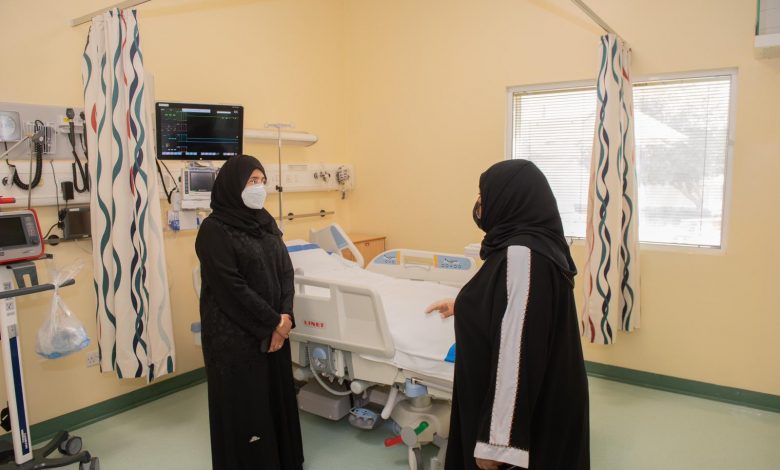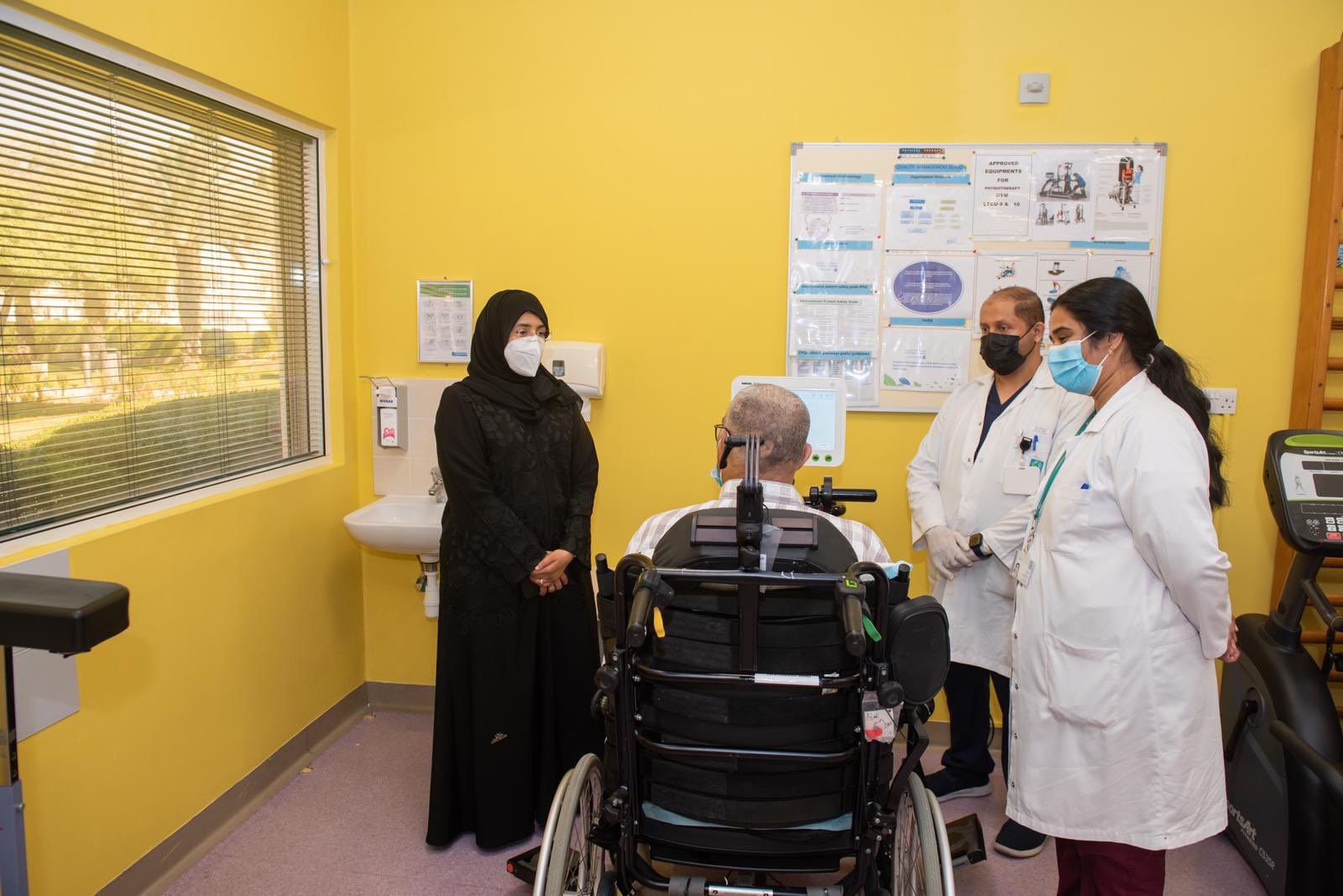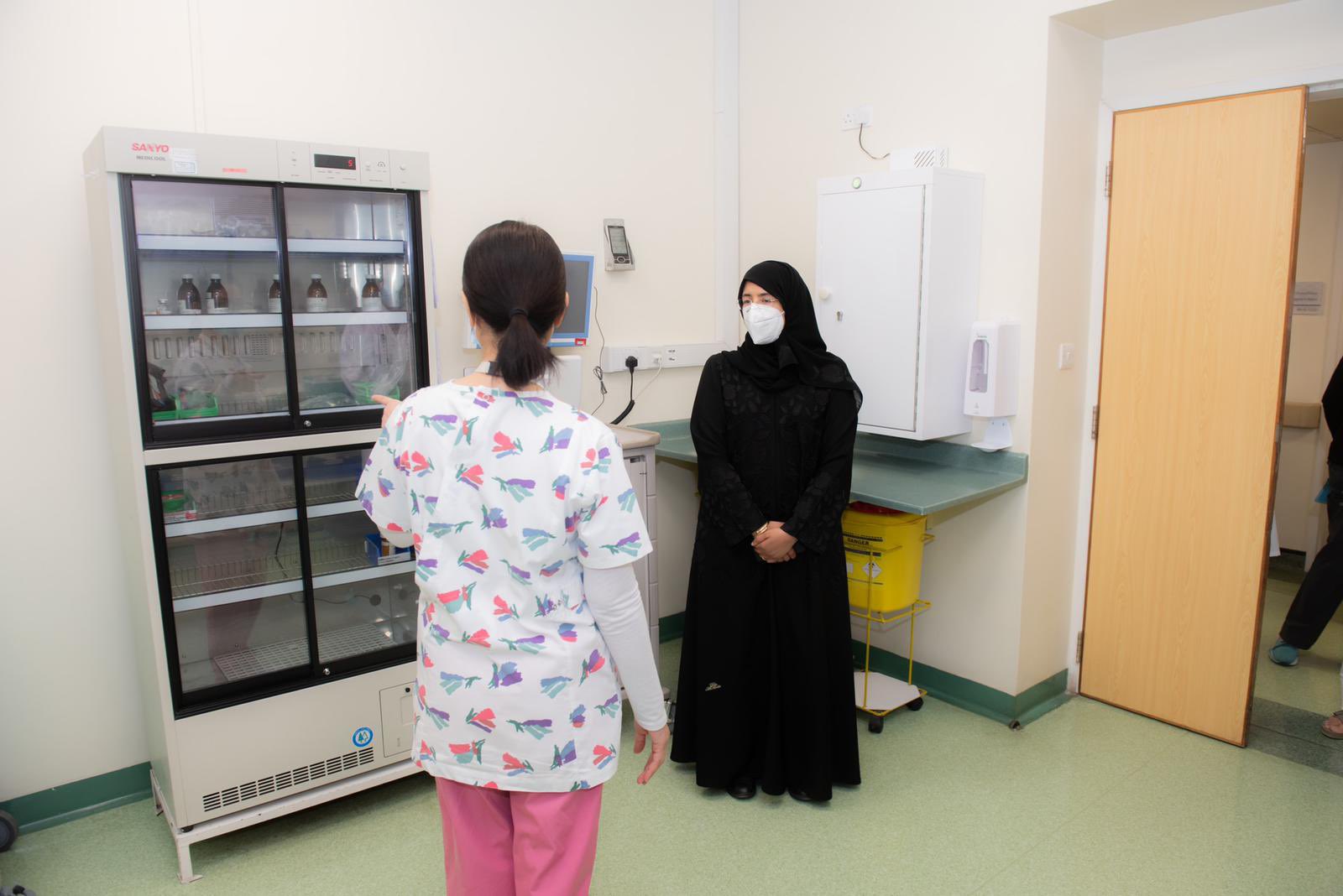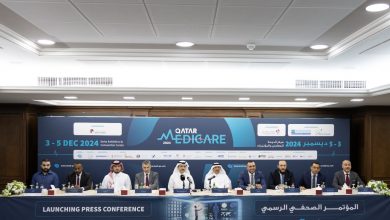
Rumailah Hospital opens first acute weaning unit
افتتاح وحدة متخصصة بالفطام عن أجهزة التنفس الاصطناعي بمستشفى الرميلة
QNA
Doha: HE Minister of Public Health Dr. Hanan Mohammed Al Kuwari officially opened on Monday the first Acute Weaning Unit in the State of Qatar dedicated to liberating patients from mechanical ventilation.
The creation of the state-of-the-art unit is the fruit of a unique collaboration between specialist multidisciplinary healthcare teams in geriatric medicine, internal medicine, medical intensive care units (MICU) across Rumailah Hospital, Hamad General Hospital. The new therapeutic service is dedicated to liberating patients from mechanical ventilation and enabling them to breath normally and thereby gain more independence.

Commenting on the occasion, HE Minister of Public Health Dr. Hanan Mohammed Al Kuwari said that Rumailah Hospital is Qatars longest running hospital and is exemplary in how it keeps developing and expanding its services to provide specialist care to patients, noting that the Acute Weaning Unit marks a new achievement for Rumailah Hospital during the ongoing COVID-19 pandemic, complementing the numerous other specialist services established there over the past year.
HE the Minister added that the unit has and will continue to enable patients who post health crisis such as strokes or infections to return to normal life. It is also a testimony to the strength of the clinical leadership teams across HMC who have never wavered in their efforts to help protect and care for their patients.
For her part, Hanadi Khamis Al Hamad, National Lead for Healthy Ageing in Qatar and Medical Director of Rumailah Hospital (RH), stated that a major goal of managing any patient who requires prolonged mechanical ventilation (PMV) is to try and wean them off from the mechanical ventilator as soon as possible after it is deemed clinically safe.
“Reducing the amount of time a patient spends on the ventilator can substantially improve their quality of life. However, the process of waning patients who have been on a ventilator for a prolonged period of time can be challenging both clinically and emotionally for the patients and their families. Our team of experts are trained to provide specialist clinical support to patients who require basic respiratory support and minimum hourly observation. As this is a step-down unit, (where patients are no longer deemed to be in a critical stage), families can also benefit from having closer interaction and more time with their loved ones,” said Dr. Al Hamad.
Dr. Nadir Kharma, Senior Consultant MICU spearheaded the program, explained that this multidisciplinary, rehabilitative service is offered in a highly specialized, healing and caring environment which provides the physical, cognitive, and palliative therapies needed to recuperate.

“Once fully operational, the unit will have 13 beds, including three with dialysis capability, a dedicated therapy room and spaces for multidisciplinary (MDT) staff meetings, pharmaceuticals and supplies. The close collaboration between physicians, nurses and allied health professionals is essential to providing the necessary holistic care to patients to help them on their journey of recovery. This unit is an ideal place for continuous monitoring of the patients condition during the initial phase of admission to the weaning unit and during active weaning trials,” said Dr. Kharma.
Dr. Ibrahim explained that a mechanical ventilator is an essential device to help patients breathe (ventilate) when they cannot do so on their own, either during surgery or due to a critical illness.
“We have had several acute COVID-19 cases where the patient had to be placed on a ventilator due to the severity of the infection. While mechanical ventilation is often essential to keep a person alive, but like many other clinical interventions, the risk of infection is what drives physicians to wean patients off the ventilator as soon as possible. Not only can reducing the number of days of mechanical ventilation reduce the likelihood of ventilator-associated pneumonia but being able to breath without a tube enables the patient to speak, become more functionally mobile and give them a sense of being more in control again,” said Dr. Ibrahim. “This unit provides an excellent facility for patients who have been transferred from the intensive care units in HGH, to help them in the next phase of their recovery process.”
قنا
الدوحة: افتتحت سعادة الدكتور حنان محمد الكواري وزيرة الصحة العامة، رسميا أول وحدة متطورة تختص في الفطام عن أجهزة التنفس الاصطناعي في دولة قطر.
ويأتي إنشاء هذه الوحدة الأولى من نوعها ثمرة للتعاون بين فرق الرعاية الصحية المتخصصة ومتعددة التخصصات في طب الشيخوخة والطب الباطني ووحدات العناية المركزة الباطنية بمستشفى الرميلة ومستشفى حمد العام، لتقديم خدمة علاجية جديدة تتيح فصل أجهزة التنفس الاصطناعي عن المرضى وتمكنهم من التنفس بشكل طبيعي، وبالتالي الحصول على مزيد من الاستقلالية بهذا الخصوص.
وأكدت سعادة الدكتورة حنان محمد الكواري، أن مستشفى الرميلة باعتباره من أقدم مستشفيات قطر، يعد نموذجا للاستمرار في التطور والتوسع في خدماته من أجل توفير رعاية متخصصة للمرضى.. مشيرة إلى أن إنشاء وحدة الفطام عن أجهزة التنفس الاصطناعي تشكل إنجازا جديدا لمستشفى الرميلة خلال فترة وباء /كوفيد-19/ ومكملة للخدمات العديدة الأخرى المتخصصة التي أنشئت هناك خلال العام الماضي.

ونوهت بأن هذه الوحدة ستقدم الدعم اللازم للمرضى الذين يتعرضون لأزمات صحية مثل الجلطات الدماغية والعدوى لمساعدتهم على العودة لحياتهم الطبيعية، مما يعتبر دليلا على تميز فريق القيادة الطبية في مؤسسة حمد الطبية الذي لم يتوان في جهوده للمساعدة في توفير الحماية والرعاية للمرضى.
من جانبها، أوضحت الدكتورة هنادي خميس الحمد، قائد برنامج الشيخوخة الصحية في الاستراتيجية الوطنية للصحة والمدير الطبي لمستشفى الرميلة، أن الهدف الرئيسي من إدارة حالة أي مريض يحتاج لجهاز تنفس اصطناعي على المدى الطويل هو المحاولة لفصله أو فطمه عن هذا الجهاز الاصطناعي في أقرب فرصة ممكنة بعد التأكد طبيا من سلامة ذلك الإجراء.
وقالت إن خفض المدة الزمنية التي يقضيها المريض على جهاز التنفس الاصطناعي يمكن أن تحسن من جودة حياته بشكل كبير “إلا أن عملية فطام المرضى الذين قضوا فترة طويلة على جهاز التنفس الاصطناعي يمكن أن يكون صعبا من الناحية الطبية والعاطفية للمرضى وأسرهم”. وأضافت أن “فرق الخبراء لدينا مدربون لتقديم دعم سريري متخصص للمرضى الذين تتطلب حالتهم دعما تنفسيا أساسيا وأدنى حد من المراقبة على مدار الساعة حيث لا يصنف هؤلاء المرضى بأنهم في حالة خطرة، وفي هذه الحالة يمكن للأسر أن يتفاعلوا مع مريضهم ويقضوا معه وقتا أطول”.
بدوره، أوضح الدكتور نادر خرما قائد هذا البرنامج أن الخدمات متعددة الاختصاصات والخدمات التأهيلية تقدم في بيئة توفر العلاج والرعاية الجسدية والإدراكية والتلطيفية اللازمة للتعافي.
وأضاف “بمجرد تجهيزها بشكل كامل، ستوفر الوحدة 13 سريرا من ضمنها 3 أسرة لغسيل الكلى وغرفة مخصصة للعلاج ومساحة مخصصة لاجتماعات الموظفين من مختلف التخصصات، بجانب مرافق الصيدلية واللوازم الأخرى”.. منوها بأن هذه الوحدة تعد مكانا مثاليا للمراقبة المستمرة لحالة المريض خلال المرحلة الأولى من إدخاله إلى وحدة الفطام عن أجهزة التنفس الاصطناعي وإجراء التجارب لمحاولة فصله أو فطمه عنها.
من جهته، أوضح الدكتور عبدالسلام إبراهيم استشاري أول ومدير قسم العناية الطبية المركزة الباطنية بمستشفى حمد العام، أن جهاز التهوية الميكانيكية يعتبر أداة هامة لمساعدة المرضى على التنفس عندما لا يكون بإمكانهم ذلك بمفردهم، إما أثناء العملية الجراحية أو عند اشتداد المرض.

وقال “هناك العديد من حالات /كوفيد-19/ الحادة التي يتم فيها وصل المريض بجهاز التنفس الاصطناعي نتيجة حدة الإصابة”.
وأشار إلى أنه بينما يعتبر جهاز التنفس الاصطناعي أساسيا للحفاظ على حياة الشخص، هناك دواع طبية تتطلب فطم المرضى عن جهاز التنفس الصناعي في أسرع وقت ممكن، لافتا إلى أن تقليل عدد أيام التهوية الميكانيكية يعمل على تقليل احتمالية الإصابة بالالتهاب الرئوي، كما أن القدرة على التنفس بدون أنبوب تمكن المريض من التحدث، ويصبح أكثر قدرة على الحركة من الناحية الوظيفية، ما يمنحه إحساسا بأنه قادر على التحكم مرة أخرى.
كما توفر هذه الوحدة مرفقا ممتازا للمرضى الذين تم نقلهم من وحدات العناية المركزة بمستشفى حمد العام لمساعدتهم في المرحلة التالية من عملية الشفاء.



